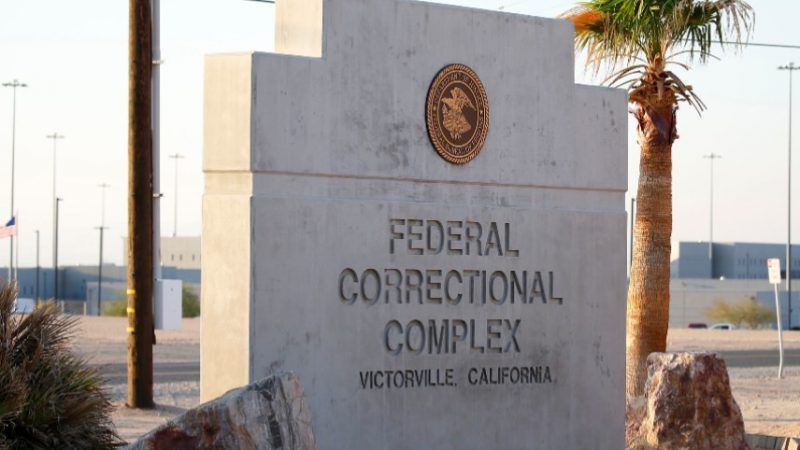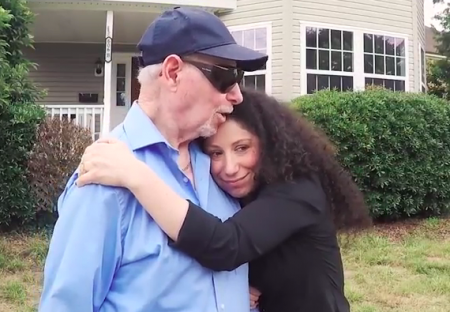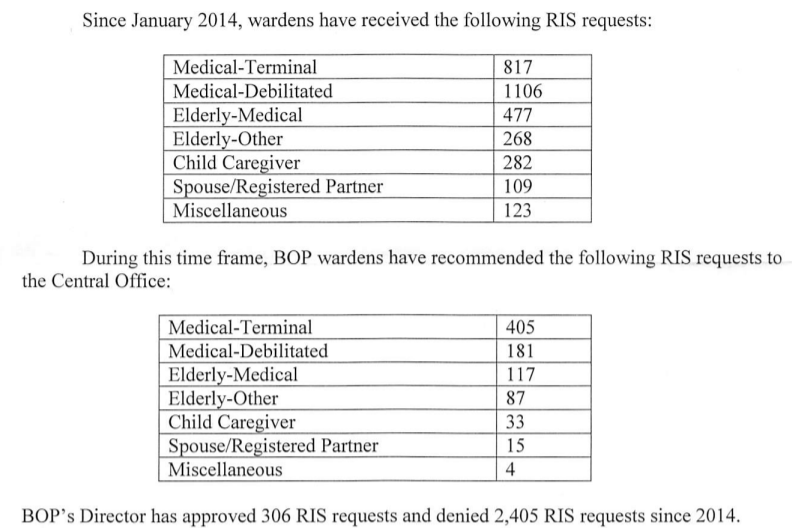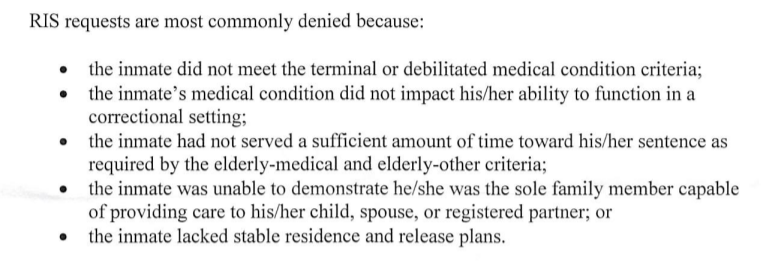81 Federal Prisoners Have Died While Waiting for the Government to Decide If They Were Sick Enough to Go Home
The Justice Department has finally shared data from the "compassionate release" program, and the numbers aren't pretty.


Since 2014, at least 81 elderly and terminally ill federal prisoners have died while waiting for the Bureau of Prisons (BOP) to rule on their applications for "compassionate release," according to a letter the Justice Department letter sent to 12 members of the Senate. The letter was obtained and published by Families Against Mandatory Minimums.
"We are disappointed but not surprised," says Kevin Ring, president of Families Against Mandatory Minimums (FAMM).* A nonprofit devoted to sentencing reform, FAMM is pushing the BOP to reduce the sentences of elderly and ill prisoners.
Congress created compassionate release in 1984, the same year it abolished parole in the federal system, in order to provide the Bureau of Prisons with a systematic method for shortening the sentences of federal prisoners whose "extraordinary and compelling" circumstances merit early release. No list of criteria constrains the BOP's ability to grant compassionate release.
Two years ago, The Washington Post profiled several federal prisoners who seem like textbook candidates. One of them was a nonviolent marijuana trafficker named Michael Hodge who applied for compassionate release after being diagnosed with metastatic cancer. His request was denied, and Hodge died behind bars in 2015. Bruce Harrison, 65, also had his request denied. Sentenced in 1994 to 50 years for delivering drugs on behalf of undercover federal agents, Harrison, a recipient of two purple hearts during the Vietnam War, now suffers from neuropathy and vertigo. "Compassionate release is conspicuous for its absence," declared the authors of a 2012 report from Human Rights Watch.
If people like Hodge and Harrison aren't receiving compassionate release, who is? We don't know. Unlike commutations and pardons, which are approved by the President and published in detail by the Office of the Pardon Attorney, the review and approval process for compassionate release is a black box. That's why 12 senators sent a letter last August to the Justice Department requesting five years' worth of data about the compassionate release program. A month earlier, Sen. Richard Shelby (R-Ala.) inserted language into the appropriations bill requiring the DOJ to reveal how many prisoners died awaiting a response, how many applications had been granted and denied, and how long prisoners had to wait on average before receiving a response.
The DOJ's letter answers many of these questions. In addition to the 81 prisoners who died while waiting for a response, the letter reveals that the BOP Central Office has has denied 2,405 compassionate release requests since 2014. BOP wardens recommended nearly three times more reductions in sentence (RIS) than were granted by the BOP Central Office in Washington, D.C.: 842 warden recommendations compared to 306 grants from the BOP's Central Division.
The DOJ's letter also omits the subcategories for grants, despite sharing them for requests:

"The local warden and his or her staff know best which prisoners in their care merit early release," Ring tells me. "The fact that central office bureaucrats are rejecting so many petitions sends a terrible message to the wardens who are trying to do the right thing. Wardens should be encouraged to identify sick and elderly prisoners who can be safely released. Early release will help ease overcrowding and save money. But if the people on the ground making smart recommendations are just going to rebuffed by Washington, they will stop trying."
While the DOJ told the senators what kind of requests the BOP Central Office received, it declined to share the criteria that led to grants. Were all 306 grants for terminal illness? If so, why did the Central Office deny the additional 100 terminal illness applications recommended by wardens? Did the BOP grant any compassionate release sentence reductions for chronically ill or physically disabled prisoners? What about prisoners whose children lost a parent and needed a breadwinner? And what's happened to 817 medical-terminal applicants who've applied since 2014? It seems to assume that however many are not among the 306 are now dead.
The DOJ also revealed common reasons for denying compassionate release requests. Some of these rationalizations are pretty horrifying:

The inmate wasn't in prison long enough to deserve not to die there? The inmate was capable of functioning in a prison setting despite their illness? Go click the link for that Washington Post story and look at the pictures, and then tell me the BOP's definition of "ability to function" is not outrageously broad.
The letter also reveals that the BOP has no sense of urgency for these cases. Processing times for grants averaged 141 days—nearly five months—while denial processing times averaged 196 days, almost seven months; that's too much time for terminally ill prisoners and for people whose home lives have deteriorated to the point that the bureau would allow them early release. In fact, requiring prisoners to wait that long, especially if their applications come recommended by a warden, defeats the purpose of the program. We know the department spent too much time deliberating for at least 81 prisoners. Congress should ask the department how many more people died after receiving a rejection, whether they were serving time for a drug offense (as half the federal prison population is), and why those prisoners were not granted the small mercy of dying outside a cage.
*Full disclosure: I served as FAMM's communications director from 2014-2016.
Editor's Note: As of February 29, 2024, commenting privileges on reason.com posts are limited to Reason Plus subscribers. Past commenters are grandfathered in for a temporary period. Subscribe here to preserve your ability to comment. Your Reason Plus subscription also gives you an ad-free version of reason.com, along with full access to the digital edition and archives of Reason magazine. We request that comments be civil and on-topic. We do not moderate or assume any responsibility for comments, which are owned by the readers who post them. Comments do not represent the views of reason.com or Reason Foundation. We reserve the right to delete any comment and ban commenters for any reason at any time. Comments may only be edited within 5 minutes of posting. Report abuses.
Please to post comments


While the DOJ told the senators what kind of requests the BOP Central Office received, it declined to share the criteria that led to grants.
None of your bee's wax, senators!
Congress can always subpoena the head of the BoP and place the turd under oath.
I'm making over $7k a month working part time. I kept hearing other people tell me how much money they can make online so I decided to look into it. Well, it was all true and has totally changed my life. This is what I do... http://www.onlinecareer10.com
I'm making over $7k a month working part time. I kept hearing other people tell me how much money they can make online so I decided to look into it. Well, it was all true and has totally changed my life.
This is what I do... http://www.onlinecareer10.com
Compassionate release, like mandatory minimums, is just a red herring. Both issues ignore the fundamental question: does placing a particular person convicted of a particular crime make society better off. If someone is dangerous or committed a horrible violent crime, why should they get do die in peace outside of prison? On the other hand, if a particular prison gains widespread sympathy across the political spectrum sufficient to merit release, it's likely that the person isn't much of a threat and hasn't done anything truly despicable.
If someone is dangerous or committed a horrible violent crime, why should they get do die in peace outside of prison?
This is a red herring that ignores the fundamental question: does placing a particular person convicted of a particular crime make society better off.
This is a red herring that isn't a complete sentence or a question.
Both issues ignore the fundamental question: does placing a particular person convicted of a particular crime make society better off. If someone is dangerous or committed a horrible violent crime, why should they get do die in peace outside of prison?
Uhh... what?
Read "placing" as "imprisoning".
The federal prison system is made up mostly of white collar criminals, drug offenders, and immigration offenders. Most violent and property crime offenders are incarcerated in state prisons. I think there's an argument to be made for compassionate release for violent offenders, particularly considering the low risk of recidivism versus the high cost of keeping them locked up, but that's an argument for a different post.
Start earning $90/hourly for working online from your home for few hours each day... Get regular payment on a weekly basis... All you need is a computer, internet connection and a litte free time...
Read more here........ http://www.startonlinejob.com
I'm sure the answer will be horrifying, but why did they eliminate parole in the federal penal system?
I've asked many people this question since I first learned that the federal system did away with parole, and the answers generally boil down to high volume, inadequate resources and staffing, inefficiency, inconsistency in parole grants, and the appearance of capriciousness (none of this should be surprising considering anecdotal evidence of parole boards favoring prisoners who convert to some religions while incarcerated). I've also spoken to state prisoners who find indeterminate sentencing (in which prisoners receive a sentence of 5 to 20 years, with parole eligibility at five years, but no guarantee of release until they've served the full 20) to be maddening, as it's not clear what exactly they have to do in order to be paroled, and are told to try again when they come up for a hearing and are denied. Determinate sentencing in the federal system--you will do X number of years, with a maximum possible reduction of 15 percent for "good time"--is considered to be fairer on its face. Many sentencing reformers agree that determinate sentencing is conceptually fairer, but that it's undermined by sentence length inflation and mandatory minimums.
Yeah, the more I think about it the less I like parole system anyway. There don't seem to be any clear criteria for what constitutes reform or no longer being a danger to society. Plus parole boards can be capricious assholes.
But the mechanisms for early release is less of a concern than the unnecessarily long sentences being imposed in the first place.
I've asked many people this question since I first learned that the federal system did away with parole, and the answers generally boil down to high volume, inadequate resources and staffing, inefficiency, inconsistency in parole grants, and the appearance of capriciousness (none of this should be surprising considering anecdotal evidence of parole boards favoring prisoners who convert to some religions while incarcerated).
IOW, due to bureaucratic incompetence they decided that no one should ever get parole. Wow.
If only the IRS would follow the BoP's example. E.g., "due to our stupidity and incompetence, we've decided not to bother with collecting income taxes."
Fed time seems worse than state. If you get 10 years fed time thats 8.5 years guaranteed while in state time thats only 5 years. Still crazy that you need to do X amount of years for any crime except murder, rape and ponzi schemes.
Depends on your state Joiep. In Virginia we did away with parole decades ago and it was a good thing for the state. The Democrat party was screaming about how we would have jails overflowing with too many inmates but they were wrong because what it did was shut the revolving door to prison for those being paroled early and reoffending. We had built prisons we were going to need but ended up bringing in prisoners from other states to use the extra room and make a bit of money for the state. We have good time of 15 percent just like the Federal system and it works fine.
In effect, the criteria for parole are always:
2) Did the convict behave well in prison? This is not predictive of how he will behave as a free man. OTOH, it makes parole boards a useful tool to control the prisoners.
1) Was the crime so repulsive that you want the prisoner to serve as much time as possible? In other words, does the parole board, after spending a few minutes reading a summary of the record, want to overturn the sentence imposed by a judge or jury that heard all the evidence?
"...FAMM is pushing the BOP to reduce the sentences of elderly and ill prisoners."
If only there were some way the executive branch could cut through the red tape and release sick prisoners when warranted...
"Unlike commutations and pardons, which are approved by the President and published in detail by the Office of the Pardon Attorney, the review and approval process for compassionate release is a black box."
Hey, that gives me an idea! Why can't FAMM campaign for executive clemency for those who fall through the cracks in the BOP?
And this time you can put the focus on Trump in a way that's actually relevant - and central - to the story you're covering.
The only drawback is that they'd be asking Trump for help, which means they wouldn't want to alienate him, and hence they might have to leave their obscene hats and IMPEACHMENT NOW placards at home.
Once again we see that Donald Trump is the real victim here.
I support petitions to President Trump, and just because the petitions should be framed so as to persuade not insult him, you think I'm calling him a victim?
I was actually implying a couple of negative things about trump (a) that he's getting off lightly on this issue due to the focus on the Bureau of Prisons (the czar's bad advisors), and (b) that he's thin-skinned enough to be put off by a disrespectful petition even if it is meritorious.
I'd like to see a breakdown of denial reasons.
Because if a large percentage of denials are due to "lack of stable residence and release plans" then the denials may actually be the more compassionate option. Not that I'm convinced that 'compassion' is remotely within the mission of the Federal BoP.
Although, the whole thing is slightly silly. Presumably those people would still be dead, and still be dead at public expense (albeit more of the cost would be shifted to the State of residence via Medicaid.)
"Not that I'm convinced that 'compassion' is remotely within the mission of the Federal BoP."
And to be clear, not because it is not desirable, but primarily because it is not possible.
Meanwhile even if youre a known killer the state is willing to reduce your sentence significantly if you snitch on other ppl. Happens all the time Rico and CCE cases where the violent guys snitch on the non violent ones and they get 7-15 years while the non violent guys get stuck with +30 years.
They should consider themselves lucky to be federal prisoners, as far as healthcare, welfare and "perks" go. State prisons have far less accountability and would often just let them die.
We have this belief that if you're convicted of a "violent" crime, you should be caged, catalogued, and considered unworthy of any further consideration. People forget that what constitutes a felony varies widely among states. A minor, drunken scuffle is a minor misdemeanor in one state, and is a "seven deadly sins, mandatory sentence" major felony in another.
"We have this belief that if you're convicted of a "violent" crime, you should be caged, catalogued, and considered unworthy of any further consideration"
Lol found the wife beater.
Trumptards believe that if you cross an imaginary line without his governments permission you should be arrested and deported.
By deported I'm assuming you mean sent back across an imaginary line?
Ha! Never dumb enough to get married, and definitely NOT a "Trumptard." I'm also a member of neither red, nor blue team - I prefer to do my own thinking. I don't greatly concern myself with immigration issues, though I am somewhat nervous that any "wall" will (as usual) be eventually turned against the American people. Trump's recently released budget proposal is not very pleasing, either...especially in light of SecDef Mattis stating "we [at the Pentagon] got everything we wanted!" I suspect we're in for a rough ride, personally.
A true example scenario:
A lifelong, trustworthy friend of mine was lost, walking in a big city & seriously dehydrated. Couldn't find a water fountain or even a store, and then saw a man splitting firewood in his yard. He asked for some water from his hose. "I'll do you one better! Come on in and you can have a glass of ice water." The homeowner then hit on him, and he tried to nicely explain that he wasn't gay. The guy then tried to sexually assault him! When he refused, homeowner attacked him with an axe! He finally managed to escape, scared shitless, but the maniac called the cops and accused him first.
No bodily injury whatsoever. A true "he-said-he said" situation. He was charged with home invasion and attempt murder - serious felonies! 2 years later, bankrupt, he pled to agg. assault and nolle prossed burglary. He repeatedly demanded a polygraph, at his expense. Polygraphs are inadmissable, thus the pub. defender was uninterested. He asked for fingerprinting on the axe, and other basic police work. Refused. He was convicted: 5 years!
A 90%+ conviction rate here, and most folks always believe police - even when they witness nothing! "Winning" is all. Innocence & guilt aren't considered. The lesson? Things aren't always what they seem! Routine overcharging. Statist grand juries. Police "testilying" acceptable. Sloppy investigations (or none). Just a few problems with American "justice."
I don't know of anyone being railroaded that hard in my personal life, but I do know of plenty of people getting fucked for smaller stuff. I'm not going to try to second guess your buddy, but I'd have thought something like the ACLU or somebody might have been able to help out in such an insane circumstance. Public defenders are mostly the worst people on earth, and rarely ever care at all about their "clients."
He was straight; no ACLU for him.
No matter what any of you say the government has no duty to let out prisoners before their sentence ends, even if they are dying.
No matter what any one says no one has a duty to obey the government.
"Since 2014, at least 81 elderly and terminally ill federal prisoners have died while waiting for the Bureau of Prisons (BOP) to rule on their applications for "compassionate release," "
Reason News Alert:
Elderly and terminally ill prisoners sometimes die
We need to fix the types of crimes and lengths of sentences. I have no problem being a hardass with people who did fucked up shit. Letting some guy who shot somebody during a robbery rot away and die in prison in his old age is fine by me. Some guy who got 30 years for having a half pound of weed... Not so much.
I'm sure some of the people denied shouldn't have been, and for that matter some of the people granted release probably shouldn't have been. That is the nature of government incompetence!
$89 an hour! Seriously I don't know why more people haven't tried this, I work two shifts, 2 hours in the day and 2 in the evening?And i get surly a chek of $1260......0 whats awesome is Im working from home so I get more time with my kids.
Here is what i did
+_+_+_+_+_+_+_+ +_+_+_+_+_+_+_+_+ http://www.homework5.com